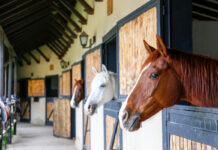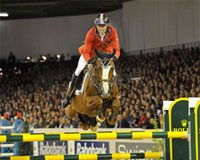 |
| Click for larger image. Rebecca Hart rode Nortessa in their final competition together at the World Equestrian Games. Photo: Kitson Jazynka |
When Texas mom Tina Wentz needed a physical therapy program for her two-year old son Jonathan, she enrolled him in a therapeutic riding center and let the horses do their magic. Little did she know that her son, who suffers from cerebral palsy and is now 19, would go on to compete as an world-class equestrian. “I never dreamed we’d end up here,” said the beaming mom behind the scenes at Saturday’s individual freestyle para-dressage competition at the 2010 Alltech FEI World Equestrian Games. It was the second day of classes which will wrap up on Sunday with a single medal ceremony.
“I love dressage because it’s a mental and physical challenge,” said Wentz. “It’s an educated sport and there’s so much strategy involved. I knew I wanted to compete on an international stage.” Wentz started competing at age five in Western Pleasure and vaulting.
“I loved the fact that I could compete with able-bodied kids on horseback,” he recalls. “I was born a competitive athlete. I played baseball, soccer and football as a kid but there was no way to compete with kids my age.” On a horse, however, he could compete in able-bodied sports and win.
“Other kids had no idea I was disabled, until got off my horse,” he said. At 13, Wentz decided he wanted to compete in para-dressage at the World Equestrian Games in 2010 and he switched to a dressage saddle. About 18 months ago he connected with able-bodied dressage trainer Kai Handt (at the Northern Texas Equestrian Center), who is now his sponsor and trainer.
What’s next for Wentz? Focusing on making the team for the 2014 Olympics in London. Wentz’s athleticism, determination and positive outlook leaves little doubt that he will make those dreams a reality. He’s also really smart and works hard at school – he attends Southern Methodist University in Dallas, pursuing a triple major in political science, economics and history, with a minor in medieval studies, no less.
The second American rider to ride in the Grade II class today was 25-year old Rebecca Hart on the noble gelding Norteassa. Hart has owned and competed with the bay Hanoverian for eight years. The pair ended up in 14th place with a 67.200 percent. “This was an awesome day,” says Hart, who has a genetic disease that causes limited muscle control from the waist down.
Hart represented the U.S. at the 2008 Paralympics in Hong Kong, placing fourth individually. “Hong Kong and the World Equestrian Games were both extremely intense international competitions,” she said, “but the World Equestrian Games has felt like a much more intimate setting.
It was also an emotional day for the Pennsylvania-based rider as she mentioned to journalists that this would be her last competition aboard the 19-year old Norteassa, who she refers to affectionately Pippin. But retiring her beloved horse won’t stop her from setting her sights on riding at the 2012 Olympics. Now she just has to find a mount to take her there. As for Norteassa’s retirement, he’ll be enjoying a life of luxury, starting tomorrow.
Germany’s Angelika Trabert aboard Ariva-Avanti won the Grade II individual freestyle class with a 75.900 percent, followed in second place by the Netherland’s Gert Bolmer on Triumph with a 75.850 percent. Third place went to the U.K.’s Jo Pitt on Estralita with a 74.950 percent. Saturday’s individual freestyle competition also included Grade Ib, which was won by leading British para-dressage rider Lee Pearson on Gentleman with an 82.500 percent. Denmark’s Stinna Tange Kaastrup took second place riding Labbenhus and earning a 77.000 percent. Third place in Grade Ib for the individual freestyle went to Finland’s Katja Karjalainen aboard Rosie earning a 72.850 percent.
For full results, visit www.alltechfeigames.com/results
See all World Equestrian Games para-dressage news >>





